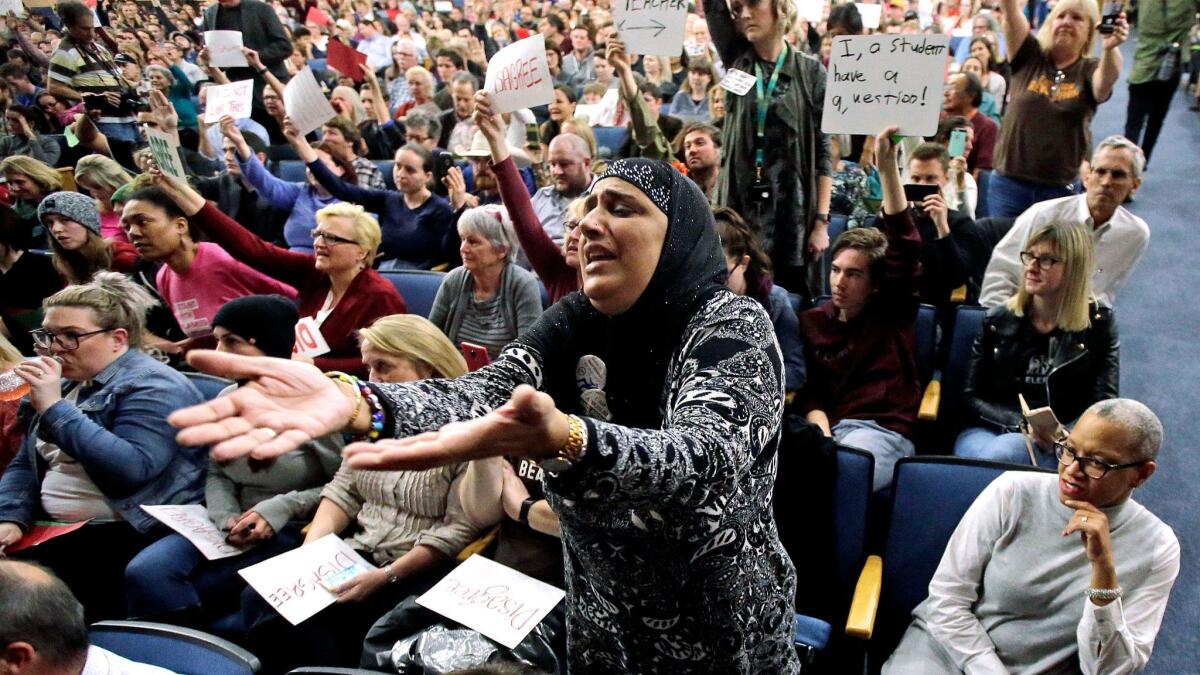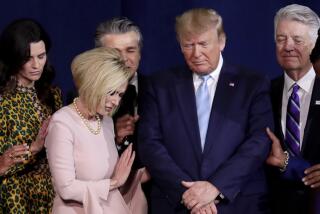Op-Ed: Travel ban 2.0 is still wrong, irrational and illegal

President Trump’s new travel ban is wrong, illegal and irrational, just like the old travel ban. It is both wrong and illegal to assume that a person is more likely to be dangerous because of his or her religion, national origin, race or ethnicity. It is irrational to believe that refugees fleeing persecution are a national security threat.
Like the prior executive order, which was announced Jan. 27, the new version issued Monday suspends the entire refugee program for 120 days. It caps the total number of refugees admitted this fiscal year at 50,000 instead of 110,000. It bars immigrants from Sudan, Syria, Iran, Libya, Somalia and Yemen for 90 days.
Two main differences stand out between travel ban 1.0 and 2.0. The first executive order included Iraq on the banned list; the second does not. The first affected those who have the lawful right to be in the United States, such as those with green cards and visas; the second does not.
Still, most of the original legal reasoning against the ban applies.
A three-judge panel for the Ninth Circuit Court of Appeals found that version 1.0 was possibly unconstitutional because it was discriminatory in effect: the designated countries are all majority Muslim. There’s also good evidence that the ban was discriminatory in intent: President Trump said repeatedly during his campaign that he wanted to ban Muslims from entering the country. And former New York Mayor Rudolph W. Giuliani, an advisor to President Trump, stated that Trump had asked for his help in “legally” creating a “Muslim ban,” and that, in response, Giuliani and others decided to use nationality as a proxy.
The new order lists exactly the same countries, except for Iraq. That’s nonsensical since the Trump administration has repeatedly said it’s worried about countries “compromised” by terrorism. If Iraq, home of Islamic State, isn’t compromised, what nation is?
The administration has not even attempted to demonstrate that existing intensive screening mechanisms are insufficient to protect national security.
More important, there is no good reason to believe that travelers or refugees from the listed countries pose a special threat to the United States. Federal Judge Leonie Brinkema of the Eastern District of Virginia, in enjoining the earlier travel ban, quoted 10 national security professionals who have served in top government positions and who declared that since the Sept. 11 attacks, “not a single terrorist attack in the United States has been perpetrated by aliens from the countries named in the order.” The Sept. 11 attacks — which were mentioned several times in the initial order — weren’t carried out by citizens of the named countries, either; the attackers were mostly from Saudi Arabia.
The Ninth Circuit panel similarly stated: “Government has pointed to no evidence that any alien from any of the countries named in the Order has perpetrated a terrorist attack in the United States.”
In these heady times, many Republicans don’t trust the judiciary — or the media. But Trump-controlled agencies have actually backed up these criticisms. Trump’s own Department of Homeland Security has said that an individual’s “country of citizenship is unlikely to be a reliable indicator of potential terrorist activity.”
Adding absurdity to absurdity, the administration has not even attempted to demonstrate that existing intensive screening mechanisms are insufficient to protect national security. Already, refugees and immigrants are carefully vetted before being allowed in the country.
There are other serious legal problems with the new travel ban. In 1965, Congress enacted the Immigration and Nationality Act, which states that no person can be “discriminated against in the issuance of an immigrant visa because of the person’s race, sex, nationality, place of birth or place of residence.” Absent a specific authorization by Congress, the president cannot simply decide to exclude Somalis, Iranians and so forth.
Trump supporters have pointed to a 1952 statute that allows the president to “suspend the entry” of “any class of aliens” that he finds are detrimental to the country’s interests. But that statute was superseded by the 1965 law. The 1952 statute, besides, did not authorize religious discrimination, which is blatantly unconstitutional. Although the president clearly isn’t versed in the Bill of Rights, he should at least consider reading the 1st Amendment. It’s just a few lines so a long attention span isn’t necessary.
Finally, the new order, like the old order, unilaterally reduces the annual level of refugee admissions, cutting it from 110,000 to 50,000. Again, this action is not only inhumane and unjustified, but illegal. The immigration statute does not allow the president to order a mid-year reduction in the level of refugee admissions. No president has attempted this before.
Travel ban 2.0 is slightly better than 1.0; at least it respects those who already have a lawful right to entry. But I expect that courts across the country will recognize that it contains many of the same flaws, and find it unconstitutional.
Erwin Chemerinsky is dean and Raymond Pryke Professor of 1st Amendment Law at the UC Irvine School of Law.
Follow the Opinion section on Twitter @latimesopinion or Facebook
More to Read
A cure for the common opinion
Get thought-provoking perspectives with our weekly newsletter.
You may occasionally receive promotional content from the Los Angeles Times.






